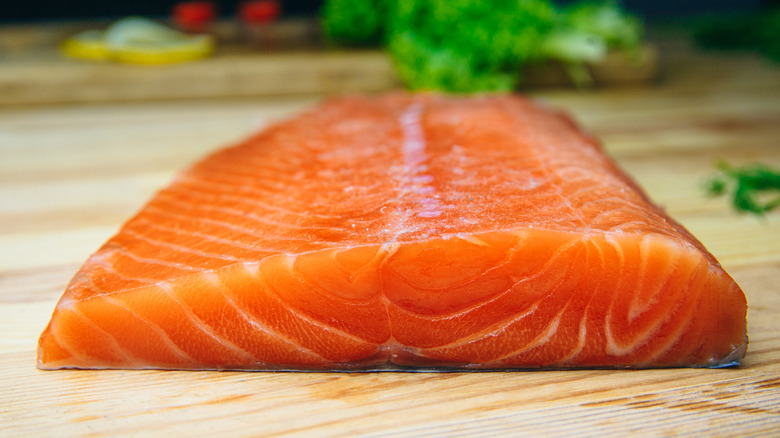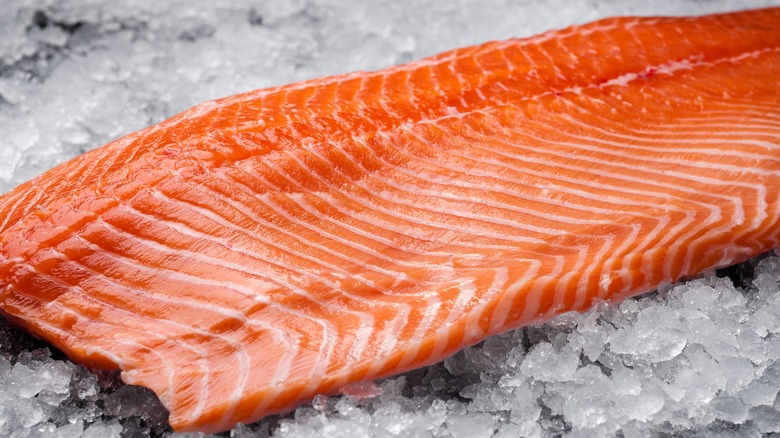What Really Happens When You Eat Salmon Every Day
Look on any list of "healthy foods" and salmon will likely show up. As the second-most eaten seafood in the United States in 2020, salmon's bright pink hue and rich taste make it a staple at dinner tables across the country and the world over. Surely, its popularity has as much to do with its nutritional profile as its flavor.
Salmon is rich in essential omega-3 fatty acids, vital for the formation and maintenance of cell structure, and helps to reduce the risk of heart disease, stroke, and the development of a range of other health conditions. No wonder regular salmon intake is highly recommended by nutritionists worldwide. As Molly Kimball, registered dietitian for Ochsner Health System, told The New Orleans Advocate, "if someone has salmon, or any type of the Omega 3 fish, at least twice a week, that's fantastic."
Of course, it's one thing to eat food recommended to us and another to know exactly how it affects our bodies. Furthermore, although eating salmon regularly can benefit your health, should you really eat it every day? Join us as we dive in and fish out the information you need to know.
What's the difference between wild and farmed salmon?
The salmon you eat will either be wild-caught or farmed specifically for human consumption. While wild salmon used to be the dominant type, salmon farming has increased enormously in the past few decades, with wild salmon stocks falling sharply (per Healthline).
Farmed salmon will generally be higher in fat, including omega-3 and omega-6 fats, and higher in calories. Wild salmon, on the other hand, will be higher in minerals like zinc, iron, and potassium. Either source comes recommended by industry professionals, with Molly Kimball, registered dietitian for Ochsner Health System, telling The New Orleans Advocate that "wild-caught is the gold standard, but I certainly don't want to discourage anyone from eating farmed salmon." Ryan Boudreaux, Southwest seafood coordinator for Whole Food Markets, added, "All salmon, fresh and farmed, is packed with Omega 3s."
However, you should know where your salmon is coming from, as not all farms are created equal. The Marine Stewardship Council recommends looking for an ASC (Aquamarine Stewardship Council) logo on your product. This indicates a responsible source that seeks to minimize the "environmental and social impacts" of salmon farming.
You could benefit from better heart health
Eating salmon daily could provide your heart with some powerful benefits. It's all down to the essential omega-3s present in the fish. The two long-chain omega-3 fatty acids, EPA (eicosapentaenoic acid) and DHA (docosahexaenoic acid) are found in high amounts in salmon and seafood in general (via WebMD). By eating them, they can help to improve your blood pressure, prevent blood clotting, and stabilize abnormal heart rhythms — all of which have an impact on your cardiovascular and wider health (via Harvard Health Publishing).
If not eating fish regularly, many people tend towards omega-3 or fish oil supplements to achieve the same health benefits. It's important to point out, however, that studies that have been done on the effects of eating fish and those on the effects of taking fish oils are generally "not comparable" due to the participants and study designs being vastly different, according to Eric Rimm, a professor in the departments of epidemiology and nutrition at the Harvard School of Public Health. Studies that focus on fish consumption generally show the benefits for those who don't already have heart disease more clearly and could be more reliable.
Your mercury levels could rise by eating salmon every day
A less attractive consequence of eating salmon every day, aside from the slightly repetitive diet you might end up with, is the risk of consuming too much mercury. Although the risk of mercury from fish isn't a huge concern for most people, according to WebMD, certain groups, such as pregnant women or nursing mothers, should be especially cautious about their intake.
A study published in The American Journal of Clinical Nutrition found that more frequent consumption of salmon results in higher blood mercury concentrations. In the worst-case scenario, a too-high mercury intake can cause anxiety, depression, numbness, and tremors. Additionally, mercury poisoning can result in muscle weakness and nerve and vision damage (via Healthline).
According to Dr. Emily Oken, associate professor of population medicine at Harvard Medical School, it's difficult to spot mercury-related health issues when it comes to seafood. As she explained to Harvard Health Publishing, "It's very complicated to tease out the harmful effects of mercury because the primary source is from fish, and fish has nutrients that are beneficial to the brain and the heart, the same organs that mercury may harm." As such, many experts recommend eating fish once or twice per week as opposed to daily (via The Nutrition Source).
Your skin could look a little brighter
Eating salmon every day could have an amazing effect on your skin, according to Dr. Rachel Nazarian of Schweiger Dermatology Group in New York. Speaking to HuffPost, Dr. Nazarian said, "I consider salmon to be one of the superfoods for skin health." This is due to the presence of both omega-3 fats, vitamin D, and astaxanthin, all of which help to protect and nurture skin health.
Nazarian continued, saying, "When you have a high level of good fat in your body it feeds the skin and allows the skin to make this healthy oil and allows the skin to be healthier. That's what gives skin the glow." Astaxanthin, too, "creates more collagen, calms inflammation, [and is] also a fantastic anti-aging agent," according to Nazarian. The dermatologist admitted that if not for the mercury levels, she'd eat it daily "because that's how good it is for your skin."
You'll protect your vision
Approximately 22 million people in the U.S. are expected to have some kind of age-related macular degeneration by 2050 — double the number of people who had it in 2019, according to Bright Focus. As such, doing what we can to help protect our eyesight is important. Eating salmon regularly could be a powerful tool in this, due to its benefits for eye health.
This is thanks to the fish's relatively high level of omega-3 fatty acids, which can help to preserve healthy eyes and normal vision (via Verywell Fit). In particular, its level of DHA could provide valuable protection, according to Dr. Ann Bajart, a corneal specialist and clinical instructor in ophthalmology at Harvard Medical School. Speaking to Harvard Health Publishing, she explained, "DHA is the primary structural fatty acid of the gray matter of the brain and the retina. So it makes sense that a DHA supplement, or diet rich in DHA, may help slow the degeneration of the retina, including macular degeneration, the most common form of blindness in older people."
Your bones could be in even better shape with a daily diet of salmon
Praise be to the skeleton. Quite literally providing the framework for our bodies, our bones go through a lot in our lifetimes, and it's an unfortunate fact that we may not consider our bone health until something less-than-pleasant, like a fracture, occurs. Therefore, eating foods like salmon regularly can help to keep our bones strong and healthy, according to WebMD. In addition to omega-3s potentially providing benefits to bone health, the fish's vitamin D content helps your body to use calcium correctly and to keep your bones in tip-top shape.
Indeed, the effect of regular fish intake on bone health has been observed in studies, such as one published in Nutrients which looked at the link between dietary intake and bone mass. The study found that among premenopausal women eating fish five to seven times a week, bone mass was higher. The study's authors concluded that "increased fish consumption is helpful in maintaining an adequate bone mass."
Your mood could improve
What we eat can have a powerful effect on our brain function. In particular, the omega-3 and vitamin levels in salmon may prove helpful in the maintenance of brain health, according to Amy Wright, integrative nutrition health coach for Itsu. She told Hello magazine, "The omega-3 fatty acids in salmon help to boost our 'good mood' serotonin levels and protect the nervous system. Its B vitamin content also helps to support brain function, energy, memory and fight stress."
According to Wright, "eating a variety of complex carbohydrates, protein and healthy fats also helps to stabilise blood sugar, which means you are less prone to energy spikes and slumps during the day and more resilient to everyday stressors." It's also important to remember that persistent low mood or energy levels could be indicative of things beyond diet, such as depression, and so it's always important to check in with a healthcare professional if this is something you're noticing.
If you or someone you know is struggling with mental health, please contact the Crisis Text Line by texting HOME to 741741, call the National Alliance on Mental Illness helpline at 1-800-950-NAMI (6264), or visit the National Institute of Mental Health website.
Eating salmon can lower your cholesterol
We tend to associate intake of higher-fat foods with elevated cholesterol levels, but there's more to the story. What's important is the type of fat we're consuming. Saturated fats can raise cholesterol levels in our blood, whereas unsaturated fats (like polyunsaturated fats) can help to lower cholesterol, according to the Mayo Clinic.
Good news for salmon-lovers: The omega-3 fatty acids that are present in the fish can help bring down cholesterol levels through the lowering of triglycerides in the blood (via WebMD). The omega-3s that we consume through eating salmon can also help to reduce inflammation throughout the body and to slow plaque growth in our arteries, leading to lower blood pressure.
That said, frying your salmon in oil is not the best idea for your health. Dr. Keecha Harris, registered dietitian and a spokeswoman for the American Dietetic Association, told WebMD, "The way that you prepare any of these foods makes a big difference in your blood cholesterol level. It's always best to broil, grill, or steam these foods."
You won't lack protein
Just 3 ounces of raw, wild Atlantic salmon contains 17 grams of protein on average, with farmed salmon generally containing slightly less protein due to its higher fat content (via Verywell Fit). Salmon is also a great source of the essential amino acids needed for our bodies to maintain muscle health and correct protein synthesis.
While salmon is a good protein source, you don't necessarily need to go hog wild on it. One common misconception is that protein intake can lead to more muscle, which Bettina Mittendorfer, professor of medicine and nutritional science at the Washington University School of Medicine in St. Louis, seeks to dispel. "You can't simply increase your muscle mass by eating more protein. That's become quite clear," she told the Center for Science in the Public Interest.
That's not to say that you shouldn't keep an eye on protein intake in general, as Mittendorfer pointed out, saying, "Adequate protein is very important. If you eat too little, you will lose muscle." But "do you need more? No," she explained.
Your nails and teeth may get stronger
Our diet affects essentially every aspect of our health, right down to the smallest parts of our bodies. And one of the reasons why salmon's reputation as a healthy choice stands tall is due to its benefits across the board, including the nails and teeth.
The omega-3s in salmon can help keep our nails strong and shiny by providing lubrication and moisture, and they can also help to reduce inflammation in the nail bed, according to Healthline. The levels of biotin, other B vitamins, and iron that come in a serving of salmon can also help keep our nails in good shape.
When it comes to our teeth, salmon is an excellent choice due to its vitamin D and calcium content. The vitamin D in this fatty fish helps our bodies to absorb calcium, which in turn helps to strengthen our teeth and preserve health in our gums, as Portman Dental Care pointed out. The all-in-one benefit provided here means that salmon's the whole package.
You could find yourself with more energy
Good nutrition is vital for keeping our energy levels stable and elevated. As such, you should know that eating salmon every day could help you feel more energized. One of the reasons for this is due to salmon's high B12 content, which, according to Healthline, serves a vital function in energy release and sustenance. Older adults are frequently deficient in vitamin B12, due to either a lack of adequate sources in the diet or a reduction in stomach acid that comes with age, which is an important aspect of B12 absorption into the body.
Vitamin B12 deficiencies can lead to fatigue, according to Healthline, as well as other symptoms including muscle weakness or stiffness, low blood pressure, or changes in mood. To make sure you're getting adequate amounts of B12 in the diet — which, it should be pointed out, most people do — eating a well-rounded diet inclusive of sources like fish, eggs, dairy products, meat, nutritional yeast, among other foods, is important.
Salmon may even improve your gut health
One interesting and often less-talked-about health benefit from eating salmon is the benefit it can have to your gut. With your gut health able to affect your entire body and the gut microbiome affecting everything from your kidneys to your heart, keeping on top of its health is paramount (via WebMD). Luckily, eating salmon regularly will likely help to preserve your gut health due to the omega-3 fatty acids you're getting with each serving.
As dietitian and founder of NAO Nutrition Nikki Ostrower told Eat This, Not That, "Wild salmon has an abundant source of omega-3 fatty acids, which is a powerful anti-inflammatory and is critical for healing an inflamed gut and preventing future episodes." Although Ostrower was speaking specifically about wild salmon here, farmed salmon is also high — and often higher — in omega-3s, meaning that you'll not miss out on this benefit should you opt for the more common farmed variety (via Healthline).
You could live longer
According to a study published in the Annals of Internal Medicine, eating fish such as salmon regularly could potentially help you reduce your risk of an early death. And it all comes down to those all-important omega-3 fatty acids. Love those guys!
The study examined over 2,600 older adults and looked at the correlation between omega-3 blood levels and longevity. The study found that those with the highest levels of omega-3s lived an average of two years longer than those with lower levels. As Dr. Dariush Mozaffarian, an associate professor of epidemiology at the Harvard School of Public Health in Boston and lead author of the study, told WebMD, "Blood levels of omega-3s are related to lower risk of death, especially cardiovascular death."
This is demonstrated in the study with an up to 27% risk of all-cause mortality compared to those with the lowest omega-3 levels in the study, and a 35% reduction of risk of cardiovascular death. What's particularly important to note, too, is this study was conducted on adults who were not taking a fish oil or omega-3 supplement, meaning that the benefit came purely from omega-3 sources in the diet.
You'll protect your brain health
If you've ever heard someone refer to salmon as "brain food," there's pretty good reasoning behind that. Eating salmon regularly could help to preserve your memory. The omega-3 fatty acids in salmon play a useful role in brain health, confirmed Dr. Scott McGinnis, an assistant professor in neurology at Harvard Medical School. He explained to Harvard Health Publishing, "There's evidence they can have anti-inflammatory and antioxidant effects as well, which means they might promote healthier brain cells and less deterioration of the brain."
McGinnis advocates eating fish for omega-3 benefits as opposed to taking an omega-3 supplement, but according to a study published in PLoS One, supplemental fatty acids could also prove useful, particularly when it comes to memory. The study, which primarily looked at the effects of DHA, found a particular improvement among older individuals who had existing memory concerns, with the authors stating, "DHA, alone or combined with EPA, contributes to improved memory function in older adults with mild memory complaints."
Eating salmon every day could help you lose weight
The words "salmon" and "fatty fish" are often interchangeable, and for some people, this might imply that salmon's highly calorific, or may cause weight gain. But in actual fact, eating salmon regularly can help you manage your overall weight effectively, as well as assist in reducing fat in specific areas, like your belly.
As a food high in protein, salmon is a great option for those wanting to feel fuller for longer and eat less overall, thanks to protein's effects on reducing appetite. As research published in The American Journal of Clinical Nutrition shows, people who eat higher-protein diets tend to want to eat less, and therefore have more success in managing weight. And when it comes to your belly, eating salmon could be your best friend, thanks to the very omega-3 fats that give it its "fatty" status aiding in lowering your total belly fat, according to Healthline. Research published in Nutrition, Metabolism & Cardiovascular Diseases demonstrates that when taking omega-3 supplements, individuals saw a reduction in belly fat as well as liver fat, pointing to the potential that eating salmon — which contains these precious fats — could have the same effect.
Eating salmon every day could give you a stronger immune system
If you're trying to bolster your immune system, maintaining a healthy diet is essential. And of all the things you could have on the menu, salmon is one of the top choices to eat to keep your immunity fighting fit. Salmon is particularly advantageous for your immune system thanks to a few key components, as Eat This, Not That! discusses. The first is its enviable vitamin D content. Vitamin D is relatively hard to come by from natural sources in your food, but salmon is packed with the stuff, delivering your body the much-needed nutrient that is so crucial to good immune health.
Other vitamins and minerals present in the fish, like magnesium and vitamin B6, are also highly important to get enough of for strong immunity. The B6 content of salmon is especially impressive, with the fish supplying one of the highest levels of the vitamin you can find naturally in a food source, says Healthline. And if that's not enough, the DHA in salmon (also known as an omega-3 fatty acid) contributes toward proper cell construction, thereby helping immune function. See? We told you it was good for you.
Eating salmon could help reduce inflammation
With inflammation contributing to many chronic conditions, finding ways to manage it throughout our bodies is vital. And luckily, if you're looking to do so through your diet (and really, you should), eating salmon every day could be a smart move, thanks to one key component.
Fatty fish like salmon is generally beneficial for inflammation thanks to the presence of omega-3 fatty acids, which "really help to tamp down inflammation in the body on a cellular level," according to Academy of Nutrition and Dietetics Spokesperson and nutritionist Kim Larson (via the Arthritis Foundation). But salmon, in particular, has a star component, an antioxidant called astaxanthin that gives the fish its vibrant pink tones (per Healthline). As research published in Molecules discusses, astaxanthin has a notable anti-inflammatory effect, as well as a positive impact on the immune system. As the study's authors note, astaxanthin could be harnessed in the future as a "multi-target pharmacological agent against various diseases."
If you eat salmon every day, you'll be supporting your thyroid health
There's a lot of talk about the thyroid, but what exactly does it do? As it turns out, a whole lot. Your thyroid — an unassuming, two-inch gland that sits in your neck below your larynx — is a hormone factory, producing hormones that regulate various bodily processes, like your heart rate and metabolism (per WebMD). Looking after your thyroid is therefore essential, and luckily, salmon's one of the best things you can eat to care for it.
Among salmon's other nutritional benefits are the levels of selenium it contains. Selenium, a mineral also found in other fish like halibut and tuna, eggs, and brazil nuts, is crucial to the function of your thyroid, which contains a large amount of it. Without adequate selenium levels, your thyroid is unable to produce the hormones it needs to, and when this occurs, you may develop thyroid dysfunction and disease (via Nature Reviews Endocrinology). On the other hand, you don't want to eat too much selenium — having an overabundance of the mineral can lead to selenium toxicity and may result in nausea, fatigue, and changes to your hair and nails.



















